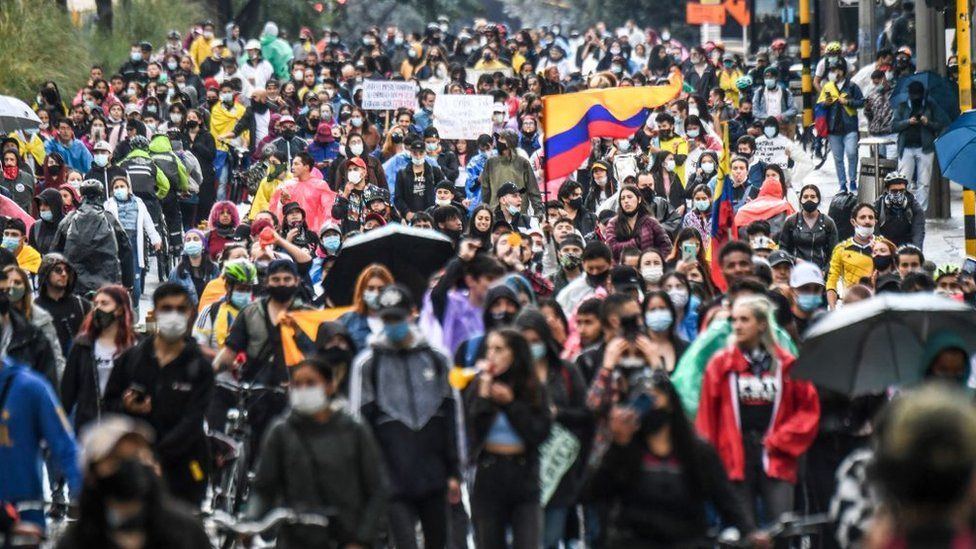Yesterday, on May 5, Colombians held a national day of strikes. This comes after over eight days of protests against the Duque Government, which continue even after the withdrawal of the tax reforms that sparked the unrest and despite brutal repression from the police and army. The weakened Duque government, meanwhile, has called for a “dialogue table” among political sectors and members of civil society as a way to dampen the discontent on the streets that’s driving the current political crisis.
Yesterday’s actions paralyzed the country with huge demonstrations in cities like Bogotá, Medellán, and Cali. These coordinated demonstrations were accompanied by blockades to reinforce the strikes which were called by the National Strike Committee — a committee made up of the central trade unions (CUT, CGT, CTC) and the Fecode (federation of educators) — but this was mainly due to pressure from the continued protests. The leaderships of these unions, which had been betting on dialogue, had originally proposed a “peaceful” demonstration to de-escalate tensions after seven days of protests where 37 people were killed according to the NGO Temblores.
You may be interested in: Colombia’s National Strike: An On-the-Ground Report from Bogotá
The protestors have been confronting the government since April 28, facing brutal repression from the police and army which has already claimed the lives of some 20 demonstrators, turning Cali into the center of the resistance. A combative youth wing of protestors, with nothing to lose, are also on the frontlines. The Colombian youth have been beaten by years of neoliberalism in a country whose policies are strongly dictated by U.S. imperialism through “Plan Colombia,” of which then-senator Joe Biden was a central architect. The plan was introduced by the United States under the guise of combating the FARC and other armed organizations.
By the end of the conflict with the FARC in 2016, U.S. interference increased and, along with it, the advance of agribusiness which affected indigenous territories and led to the persecutions and murders of environmental activists, as well as the deterioration of the living conditions of Colombia’s masses.
Thus, the huge mobilizations across the country should come as no surprise. Students from the National University of Colombia in Bogota and the University of Valle in Cali led marches. In Cali, around 5,000 members of the indigenous movement known as Minga (a Quechua word associated with collectivized work) demonstrated under the banner of “Resistance!”
Although the Duque government tried to quell the rebellion by backing down on the proposed tax reform and pushing out Colombia’s loathed Minister of Finance, the demonstrations continue because the demands go deeper than these policies and include structural issues like poverty, the health crisis (exacerbated in recent months due to the disastrous pandemic management), hunger, repression and paramilitarization, job insecurity, the persecution of student and union leaders, among other calls.
While Duque’s strategy is to quell the demonstrations through dialogue with various social sectors (unions, political parties, businessmen, students, etc.), he continues to systematically criminalize the protests. His most recent speech also contradicts his supposed intentions to engage in dialogue, calling the protesting youth “vandals” and “terrorists,” and offering 10 million pesos to those who identify protestors.
His discourse, which is supported by the extreme right wing led by former president Álvaro Uribe, seeks to separate the youth vanguard fighting in the streets from the rest of the demonstrators. The mass media, such as the newspaper La Semana, reinforce this by separating the protestors on the frontlines who are resisting repression from the more “peaceful” protestors. Other mainstream media outlets write that the resistance of the masses is equivalent to the state violence of the militarized police, which has already claimed over 20 lives. Union and political leaders also emphasize “peaceful” protests to dilute the protest movement and initiate dialogue with the repressive government.
On the side of the Colombian “progressive” parties, there was also a call for dialogue to pacify the situation. These parties played a similar role during the uprising of 2019-2020 when they held long talks to deflate the mobilizations.
On Tuesday night, Gustavo Petro of the political movement Colombia Humana, the main leader of Colombian “progressivism,” sent a recorded message where he called for demobilization to avoid more violence and asked social organizations to accept a seat at the “dialogue table.” At the same time, he said that Duque had to be saved from Uribe (i.e., he is under pressure from the Right) and that it was necessary to seek a path toward national reconciliation. Petro’s line corresponds to his electoral strategy, as he is best positioned to win the 2022 elections.
The mayor of Bogotá, Claudia López (leader of the Green Party and former ally of Colombia Humana) called for an end to the violence: “We must recognize that there have been abuses on both sides. If only the vandalism is rejected, but the abuse of force is not recognized, there is no way to start a dialogue.” She failed to add that the police have already killed more than 20 demonstrators and injured hundreds.
Rodrigo Londoño, a senator and president of the Commons party, which emerged after the peace agreement with the FARC, called for “all political and social forces to orient the mobilization towards the construction of negotiation agendas with the Duque government,” deepening his conciliatory orientation after his integration into the political regime.
Meanwhile, sectors of the Uribist ultra-right have been spreading rumors that a decree of Internal Commotion was being drafted. This can be compared to a “State of Siege,” where extraordinary powers are given to the president to suspend regional presidents, restrict demonstrations, and take control of radio and television, as well as the power to issue decrees with the force of law.
Another battle has been taking place across social media and the internet. Fans of K-pop have been boycotting right-wing hashtags such as #UribeTieneLaRazón, #YoApoyoAlEsmad, and #YoApoyoALaFuerzaPública. Elsewhere on the web, Anonymous, the notorious hacker collective, hacked senate and military web pages where they added phrases of the beloved writer Eduardo Galeano and published passwords. Until this afternoon, government officials were unable to reestablish control of their e-mail accounts.
Yesterday’s national day of coordinated strike activity is unprecedented in its scope in Colombian history. It was forged by a worker-peasant alliance as highlighted by media outlets like the BBC. The workers, together with the poor, the ruined middle class, the peasants, the indigenous, and the combative youth fed up with the traditional politicians must fight with all their strength against the criminal austerity plans of the Colombian bourgeoisie that works on behalf of U.S. imperialism. In order for these oppressed and exploited forces to win, they need a program independent of the program of the political opposition for the 2022 elections, and the one of the conciliatory union leaderships that want to take the struggle to the road of negotiation with Duque. It is therefore imperative to strengthen the organization of the rank and file so that they can organize a real general strike against Duque, his austerity plans, and imperialist forces.
First published in Spanish on May 6 in La Izquierda Diario
Translation by Maryam Alaniz












